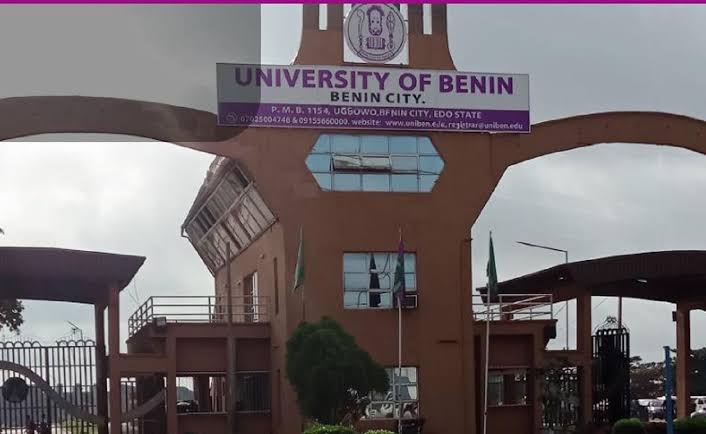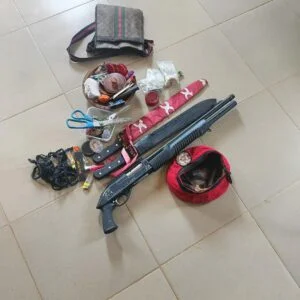Crime
Publicize the names of lecturers who were sacked for sexual misconduct, UNIBEN VC says

Tertiary institutions in the country should make it a policy to publish the names of lecturers and students dismissed for their involvement in sexual harassment, Vice-chancellor of the University of Benin, Prof. Lilian Salami, has suggested.
According to her, doing such would drastically reduce cases of sexual harassment and assault in educational institutions.
The don gave the advice in Abuja at the launch of a report on the increase in cases of sexual harassment in institutions of higher learning in Nigeria.
The document titled: “Research Report and Advocacy Strategy for Higher Institutions on Ending Sexual and Gender-Based Violence, SGBV”, was conducted by Women Advocates Research and Documentation Centre, WARDC, with support from the Open Society Initiative for West Africa, Osiwa.
Salami, who observed that sexual harassment in higher institutions had been in practice for a long, said the menace had taken new dimensions as a result of the loss of morals and values in society.
She stressed that aside from dismissing the perpetrators, whether students or lecturers, management of institutions should engage in public naming and shaming of the perpetrators.
The professor of Home Economics and Nutritional Education said: “Sexual harassment didn’t just start now but the awareness is becoming more relevant at this time because we are seeing the incidence of sexual harassment on the increase on campuses and it has become necessary that this menace is addressed in all universities.
“Administrators of universities are now taking this to be a very serious problem and we must begin to push the fact that campuses must not allow this to happen. A lot of scholars and researchers have been done about these vices and there are recommendations that once adhered to will likely reduce the cases of sexual harassment
Noting that tangible and realistic policies must be put in place in all tertiary institutions, Salami said perpetrators must be adequately sanctioned irrespective of social status.
She added: “These policies must not be in one aspect. Sexual harassment is only not only a student-lecturer thing but they are other underlying factors and we must begin to look at these factors to ensure that our solutions are holistic.
“For instance, you can’t divorce the fact that we have lost values, morals and even basic things. We are awarding our certificates not just in knowledge but character.
“Sexual harassment has always been out there but the fact is that people are beginning to speak out and we expect that we should have more persons speaking out about this incidence.
“Doing my time as a student, pornography was not there and we also have situations that students are now taking new pictures of themselves and sending them to the public domain. That was not the case in the past, so what this means is that we are having new methods of sexual harassment coming into play.
“I think that irrespective of who is the perpetrator, whether students or staff, they must be sanctioned. We don’t need such persons in our system, so they must be shown the way out. And indeed, I think not only been kicked out of the institution, I think their names should be published so that they don’t leave one institution and go to another one. This is because what that person have done in one university is likely to be replicated in another one.”
Speaking, Executive Director of WARDC, Dr Abiola Akiyode-Afolabi, said the report reflected data from 20 schools with 7,178 students participating in the research.
According to her, the report suggested that there should be more institutional strength within the university and other higher institutions in Nigeria on sexual harassment.
“The report talks about the infrastructure that we need to put in place, for example, CCTV, so that the activities of both lecturers and students can be monitored.
“The report also shows that sexual harassment is not only common with lecturers but also with students, meaning that there is a need for more awareness and training and that people should also understand the consequences of sexual harassment in educational institutions”, She stated.
Meanwhile, findings from the research revealed students were leading lecturers in sexual harassment and rape of female students.
It, however, said there is also grossly under-reported sex for promotion and other SGBV amongst staff.
The report said: “There are different manifestations and prevalence of SHGBV among different categories of people in the university community. All forms of SGBV are present on campus and with unacceptable frequency.”
“The most prevalent forms are sexual harassment followed by rape.
“The main perpetrators of SGBV are predominantly students and academic staff, although it is also common for non-academic staff to sexually harass students during the admissions process and when securing accommodation. There is also grossly under-reported sex for promotion and other SGBV amongst staff.
Crime
Police Foil Cult Initiation in Anambra, Arrest Six Suspects

The Anambra State Police Command has foiled a cult initiation ceremony in Nawfia, Njikoka Local Government Area of the state.
Spokesperson for the Command, SP Tochukwu Ikenga, disclosed this in a statement issued on Tuesday in Awka.
According to Ikenga, the operation was carried out by police operatives around 9:30am on June 15, leading to the arrest of six suspects at the scene.
Recovered during the raid were one Jojef pump action gun, two cartridges, and a golden-coloured Lexus SUV with registration number ATN 202 AE. Other items found include two cutlasses, two scissors, a cap bearing the inscription of the Supreme Vikings Confraternity, charms, and substances suspected to be hard drugs.
“They are currently undergoing police interrogation to get more insight into their modus operandi, after which the case will be charged to court on the conclusion of the investigations,” Ikenga stated.
The police spokesperson reassured residents of the command’s unwavering commitment to fighting cultism and other related crimes across the state.
Crime
Court remands 2 over alleged attempted murder

An Ikeja Magistrates’ Court, Lagos, on Wednesday, remanded two persons, Olaitan Fasasi and Kehinde Tobiloba in a correctional facility over alleged attempted murder.
Fasasi, 40, and Tobiloba, 26, whose addresses were not provided, are being charged with conspiracy, attempted murder and membership of a secret society.
The Magistrate, Mr L.A Owolabi, did not take the plea of the defendants for want of jurisdiction.
Owolabi directed the police to forward the case file to the Director of Public Prosecution for legal advice.
He thereafter adjourned the case until May 31 for mention.
The Prosecutor, Josephine Ikhayere, told the court that the defendants committed the offences at about 5.02p.m on Feb. 15, at Mushin, Lagos.
She said that Fasasi, Tobiloba and others now at large, attempted to commit murder by shooting at a resident, Alfred Ademola.
“They armed themselves with a locally made gun. They belong to Eiye Confraternity, a group proscribed by law,”, she said.
Ikhayere said that the offences contravened Sections 230(1) and 411 of the Criminal Law of Lagos State, 2012.
He said that the actions of the defendants also contravened Section 2(3)(a)(b)(c)(d) of the unlawful societies and Cultism Law of Lagos State Law.
Crime
Man jailed 3 months for stealing mobile phone

An Area Court in Jos, on Tuesday, sentenced one Jeptha John, to three months imprisonment for stealing a Redmi mobile phone valued at N165, 000.
The judge, Shawomi Bokkos, sentenced the John after he pleaded guilty to the offence.
The judge, however, gave the convict an option to pay N20, 000 fine and N50, 000 restitution to the complainant.
Bokkos said that if the convict defaulted in paying the restitution, three months should be added to his sentence to make it six months imprisonment.
Earlier, the police prosecutor, Insp Monday Dabit, told the court that the case was reported at the B Division Police Station, Jos, on Dec. 1, 2024, by Ms Nerat Danjuma.
He said that the complainant alleged that the defendant trespassed into her house and stole her mobile phone valued at N165, 000.
The prosecutor further told the court that the offence contravened the Plateau State Penal Code, Law of Northern Nigeria.
-

 Headlines4 years ago
Headlines4 years agoFacebook, Instagram Temporarily Allow Posts on Ukraine War Calling for Violence Against Invading Russians or Putin’s Death
-

 Headlines4 years ago
Headlines4 years agoNigeria, Other West African Countries Facing Worst Food Crisis in 10 Years, Aid Groups Say
-

 Foreign4 years ago
Foreign4 years agoNew York Consulate installs machines for 10-year passport
-

 News1 year ago
News1 year agoZero Trust Architecture in a Remote World: Securing the New Normal
-

 Entertainment3 years ago
Entertainment3 years agoPhyna emerges winner of Big Brother Naija Season 7
-

 Headlines2 years ago
Headlines2 years agoNigeria Customs modernisation project to check extortion of traders
-

 Entertainment2 years ago
Entertainment2 years agoMovie download platform, Netnaija, announces closure
-

 Economy2 years ago
Economy2 years agoWe generated N30.2 bn revenue in three months – Kano NCS Comptroller







